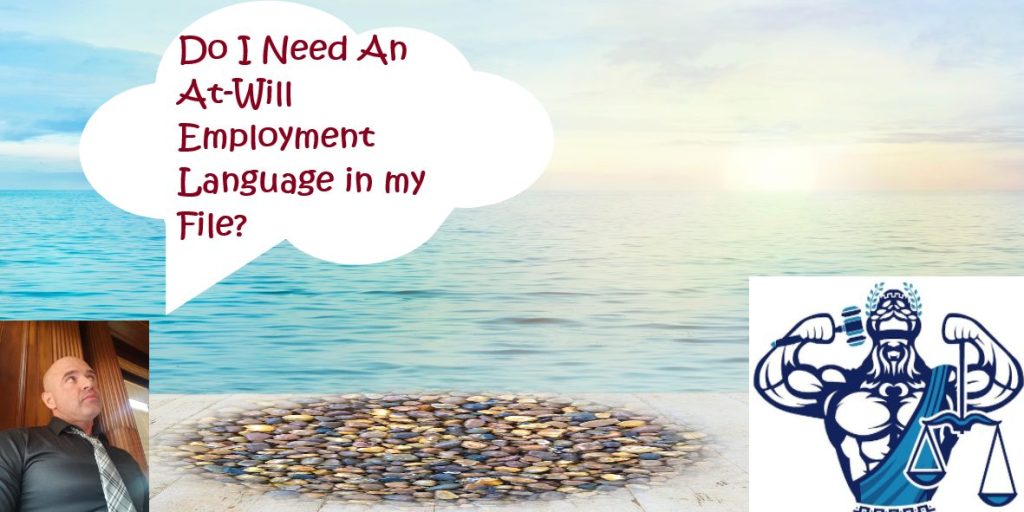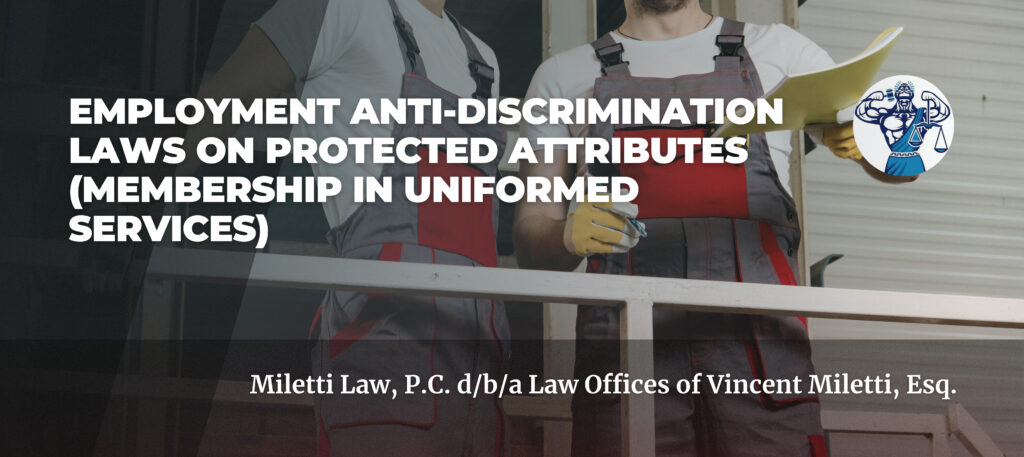Here at the Law Office of Vincent Miletti, Esq. and the home of the #UnusuallyMotivated movement, we take pride as a resilient and dependable legal services firm, providing such services in both a traditional and online, web-based environment. With mastered specialization in areas such as Employment and Labor Law, Intellectual Property (IP) (trademark, copyright, patent), Entertainment Law, and e-Commerce (Supply Chain, Distribution, Fulfillment, Standard Legal & Regulatory), we provide a range of legal services including, but not limited to traditional legal representation (litigation, mediation, arbitration, opinion letters and advisory), non-litigated business legal representation and legal counsel, and unique, online legal services such as smart forms, mobile training, legal marketing and development.
Still, we, here at Miletti Law®, feel obligated to enlighten, educate, and create awareness, free of charge, about how these issues and many others affect our unusually motivated® readers and/or their businesses. Accordingly, in order to achieve this goal, we have committed ourselves to creating authoritative, trustworthy & distinctive content, which looks to not only educate, but also deliver in a manner that only Miletti Law® can. Usually, this content is featured as videos that are posted on our YouTube Channel https://www.youtube.com/channel/UCtvUryqkkMAJLwrLu2BBt6w and blogs that are published on our website WWW.MILETTILAW.COM. With that, the ball is in your court and you have an effortless obligation to subscribe to the channel and sign up for the Newsletter on the website, which encompasses the best way to ensure that you stay in the loop and benefit from the knowledge bombs that we drop here!
In the spirit of keeping our word, this blog is Part VI of our series on federal laws that are applicable to the issues of workplace harassment, discrimination, & retaliation in New York. As mentioned since Part I, these federal laws include the Americans with Disabilities Act (ADA), Title VII of the Civil Rights Act of 1964 (Title VII), Pregnancy Discrimination Act (PDA), Fair Labor Standards Act (FLSA), Patient Protection and Affordable Care Act (ACA), Age Discrimination in Employment Act (ADEA), and Equal Pay Act (EPA), Section 1981, Uniformed Services Employment and Reemployment Rights Act (USERRA), and Family and Medical Leave Act (FMLA). In Part V, we covered “Individual Liability” as it concerns these federal laws and promised to hammer on “What Workers are Covered” under New York federal laws in Part VI. As usual, we are going to discuss coverage of each these laws in the order stated above.
What Workers are covered by Applicable New York Federal Laws?
Americans with Disabilities Act (ADA)
As provided for under clauses 42 U.S.C. § 12112(5) and 42 U.S.C. § 12112(a), any employee considered a “qualified individual” and with a covered disability is protected and covered by the ADA and, hence, the federal law prohibits employers from discriminating against or failing to providing reasonable accommodation to such individuals.
Title VII of the Civil Rights Act of 1964 (Title VII)
As provided for under clause 42 U.S.C. § 2000e(f), Title VII protects all employees except:
- A person elected to public office in any state or any state’s political jurisdiction by its qualified voters.
- An individual chosen by such a person as mentioned in (1) above to work as a personal staff of the officer.
- An immediate advisor as it concerns the exercise of the office’s legal or constitutional powers.
- An individual appointed on the policymaking level.
Furthermore, the coverage of Title VII extends to employees subject to the civil service laws of a political subdivision, governmental agency, or state government. As provided for under clause 42 U.S.C. § 2000e(f), any individual who is a U.S. citizen is covered by such terms, as it concerns employment in a foreign country.
Pregnancy Discrimination Act (PDA)
As provided for by clause 42 U.S.C. § 2000e(f) of the PDA, this federal law protects a pregnant employee except when such an employee is:
- A person elected to public office in any state or any state’s political jurisdiction by its qualified voters.
- An individual chosen by such a person as mentioned in (1) above to work as a personal staff of the officer.
- An immediate advisor as it concerns the exercise of the office’s legal or constitutional powers.
- An individual appointed on the policymaking level.
Accordingly, the PDA upholds Title VII’s provisions that extend to employees subject to the civil service laws of a political subdivision, governmental agency, or state government. As provided for under clause 42 U.S.C. § 2000e(f), any individual who is a U.S. citizen is covered by such terms, as it concerns employment in a foreign country.
Fair Labor Standards Act (FLSA)
Individuals that are only current and former employees, but not interns, independent contractors (gig workers) or prospective employees, are protected and covered by the FLSA anti-retaliation provisions. As provided for under 29 U.S.C. § 215(a)(3), the FLSA protects and covers all employees of an employer, including in those instances where the FLSA does not cover the employer and the employee’s work, simply based on FLSA’s section 15(a)(3), which prohibits “any person” from retaliating against “any employee.”
Patient Protection and Affordable Care Act (ACA)
The whistleblower provisions of the ACA protects all employees, including job applicants and former employees.
Age Discrimination in Employment Act (ADEA)
All employees aged 40 years and more are protected and covered by the ADEA. As provided for under clause 29 U.S.C. § 630(f) of the ADEA, any person who is a U.S. citizen and is employed by an employer in a workplace located in a foreign nation is considered an employee. However, the definition of employee under the ADEA does not include:
- A person elected to public office in any state or any state’s political jurisdiction by its qualified voters.
- An individual chosen by such a person as mentioned in (1) above to work as a personal staff of the officer.
- An immediate advisor as it concerns the exercise of the office’s legal or constitutional powers.
- An individual appointed on the policymaking level.
Equal Pay Act (EPA)
In line with clause 29 U.S.C. § 206(a), for an employee to be covered and protected by the EPA, such an employee must be engaged in the production of goods for commerce or engaged in commerce. Additionally, if an employer’s entire enterprise is covered, then employees of such an employer are covered by the EPA.
Section 1981
All employees working for all sizes of employers, both public and private, are covered by Section 1981.
Uniformed Services Employment and Reemployment Rights Act (USERRA)
As provided for under clause 20 C.F.R. § 1002.5 of the USERRA, an employee is defined as any individual employed by an employer. However, this definition also extends to any individual who is a United States’ permanent resident alien, national, or citizen and is employed in a workplace located in a foreign nation by an employer that is controlled by an entity organized in the U.S. or that is an entity organized or controlled by the U.S. Accordingly, all “uniformed service” employees, including Navy, Coast Guard, Air Force, Army, Marine Corps, Public Health Service commissioned corps, and each of these service’s reserve components, are protected by the USERRA.
Such employees serving in the “uniformed services” are protected based on membership, membership application, obligation for service in the uniformed services, application for service, and performance of service.
The USERRA’s regulations provide a broad definition of service to include all military service or training in time of war or peace, whether voluntary or involuntary, and comprise of:
- Service performed in participation in an authorized training program of the National Disaster Medical System (NDMS) or as an intermittent disaster-response appointee upon activation of the NDMS.
- Absence from work for an examination to determine an individual’s fitness for one of the qualifying types of duty.
- Attending a military service academy.
- Funeral honors duty performed by Reserve members or National Guard.
- Federal National Guard active duty; full-time duty, initial active-duty training, inactive duty training, or active duty for training.
Family and Medical Leave Act (FMLA)
The FMLA covers all eligible employees and, based on the federal law’s definition, an “eligible employee” is an employee that:
- Works for a covered employer.
- Has provided the employer with at least 1,250 hours of service during the 12-month period, right before the start of the FMLA date of leave.
- Has worked for the employer for at least 12 months as of the date FMLA leave is to start.
- Works at a workplace where at least 50 employees have been employed by the employer and within 75 miles of that job site as of the date when a notice of the need for leave is given by the employee.
In Part VII of this series, we will hammer on Protected Classes, as it concerns federal laws that apply to the issues of workplace harassment, discrimination, & retaliation in New York.
Until then, stay tuned for more legal guidance, training, and counsel. In the interim, reach us with questions or comments on our website at the Contact Us page!
Always rising above the bar,
Isaac T.,
Legal Writer & Author.
 Professional Legal & Business Services And Representation - English & Espanol!
Professional Legal & Business Services And Representation - English & Espanol!

 314-648-2586
314-648-2586 CALL US NOW
CALL US NOW








